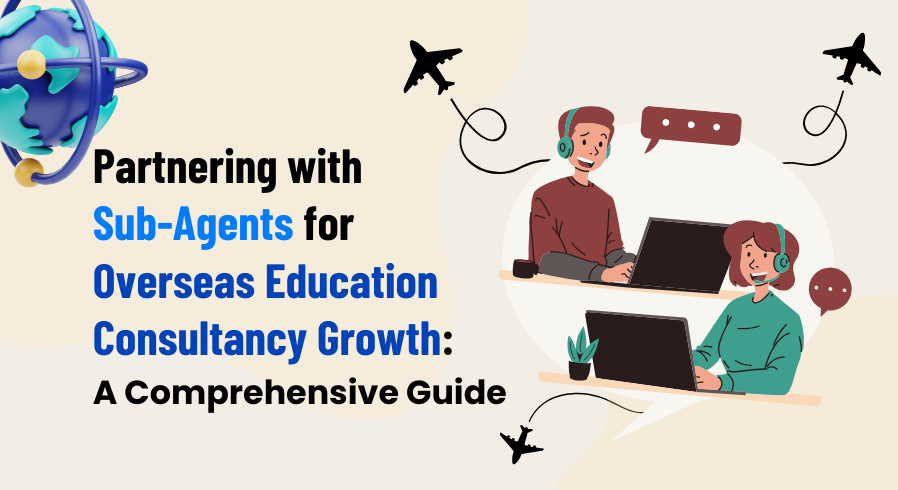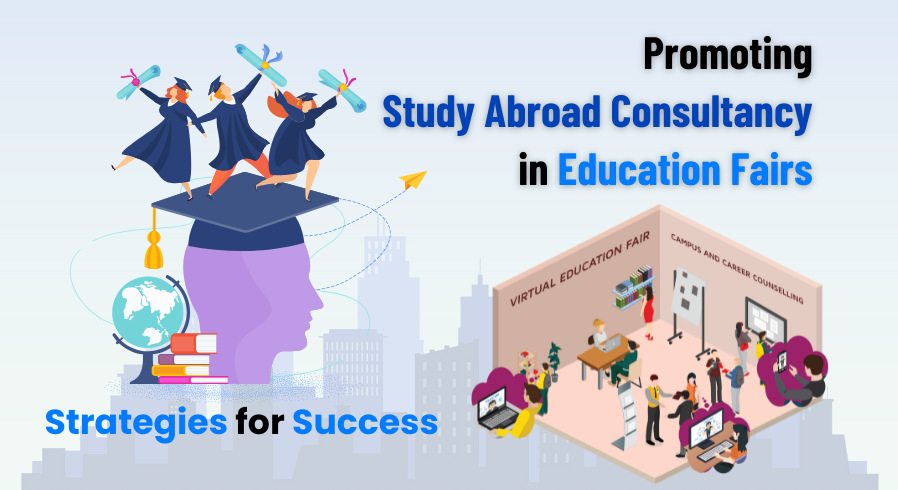Table of Contents

A Study Abroad CRM (Customer Relationship Management) platform is meant to automate and streamline the different tasks of the student recruitment and admissions process. Through data centralization, automatic repetition of tasks, and giving actionable insights, it helps lessen the stress and workload for admissions teams considerably.
A Study Abroad CRM (Customer Relationship Management) platform is meant to automate and streamline the different tasks of the student recruitment and admissions process. Through data centralization, automatic repetition of tasks, and giving actionable insights, it helps lessen the stress and workload for admissions teams considerably.
1. What is a Study Abroad CRM and Why Do Admission Teams Need It?
A Study Abroad CRM is a custom software program specifically created to take care of the overall student recruitment and admissions process. It serves as a single, centralized platform for storing, monitoring, and managing interactions with potential students so as to provide a seamless and streamlined workflow.
- Why Admission Teams Need It:
The admissions teams usually encounter large numbers of applications, manual work, repetition, and requirements for personalized contacts. A CRM avoids manual processes, minimizes errors, and prevents any inquiry or application by a student being missed. CRM also keeps the teams organized and on target doing strategic activities like counseling and developing relationships.
2. Top Benefits of Using a CRM for Study Abroad Admissions
- Enhanced Efficiency: Automates repetitive processes such as sending emails, reminders, and application status updates.
- Improved Student Engagement: Facilitates one-to-one communication, resulting in increased student satisfaction.
- Less Workload: Reduces manual labor, enabling teams to concentrate on more important tasks.
- Data-Driven Decisions: Offers insights on application trends, conversion rates, and team performance.
- Scalability: Handles increasing application volumes without compromising efficiency.
3. How Automation in CRMs Transforms the Admission Process
Automation is a game-changer for admission teams. It simplifies tasks like:
- Email Campaigns: Sending personalized emails to potential students at different stages of the admission process.
- Reminders: Reminding students automatically of deadlines, document submissions, or outstanding payments.
- Application Tracking: Real-time updating of application statuses and informing teams of incomplete or pending applications.
- Reporting: Creating reports on application patterns, team performance, and student population without effort.
4. Key Features to Look for in a Study Abroad CRM
When choosing a CRM, admission teams should look for:
- Centralized Database: One platform to hold the entire student information and communication history.
- Communication Tools: Email templates, SMS integration, and chatbots for smooth communication.
- Analytics and Reporting: Real-time intelligence on application patterns, conversion ratios, and team performance.
- Integration Capabilities: Support for integration with other tools such as payment gateways, student portals, and email platforms.
- Customization: Capability to adapt workflows, fields, and reports to suit the institution's specific requirements.
5. Case Studies: How Institutions Improved Admission Efficiency with CRMs
Real-life examples of institutions that have successfully implemented CRMs can provide valuable insights. For instance:
- Case Study 1: One university cut its application processing time by 40% after implementing a CRM.
- Case Study 2: One institution grew its student enrollment by 25% through the use of personalized communication tools within the CRM.
These are tangible advantages of the adoption of CRM.
6. How CRMs Enhance Student Experience and Satisfaction
A CRM improves the student experience by:
- Offering timely and specific communication.
- Providing a smooth application process with easy instructions and reminders.
- Decreasing response times to student inquiries.
- Providing transparency in the admission process, e.g., real-time update of application status.
7. The Role of Analytics in Study Abroad Admissions
Analytics play a crucial role in helping admission teams make data-driven decisions. A CRM can provide insights into:
- Application Trends: What programs or countries are in the most demand among applicants.
- Conversion Rates: What percentage of inquiries result in applications and enrollments.
- Team Performance: Who are the best team members to take care of inquiries or close applications.
- Student Demographics: Age, location, and academic background of applicants.
8. Common Challenges in Admission Processes and How CRMs Address Them
Admission teams often face challenges like:
- High Volumes of Applications: CRMs automate processing and tracking, lessening manual work.
- Gaps in Communication: Automated follow-ups and reminders keep no student neglected.
- Data Errors: Central data storage reduces data entry and updating errors.
- Time Management: Task management software enables teams to prioritize and achieve deadlines.
9. Integrating CRMs with Other Tools for a Seamless Workflow
CRMs can integrate with:
- Email Platforms: For smooth communication.
- Payment Gateways: To monitor fee payments and issue reminders.
- Student Portals: To give candidates timely information regarding their application status.
- Marketing Tools: To execute targeted campaigns for student recruitment.
10. Future Trends in Study Abroad CRMs
The future of CRMs includes:
- AI-Powered Insights: Predictive analytics to forecast application trends and student behavior.
- Chatbots: Automated responses to student inquiries, available 24/7.
- Mobile Optimization: CRMs accessible via mobile apps for on-the-go management.
- Blockchain Integration: For secure and transparent document verification.
11. How to Choose the Right CRM for Your Institution
Consider factors like:
- Scalability: Can the CRM handle growing application volumes?
- Ease of Use: Is the interface user-friendly for your team?
- Cost: Does it fit within your budget?
- Support: Does the provider offer training and customer support?
- Customization: Can it be tailored to your institution’s unique needs?
12. Tips for Successful CRM Implementation in Admission Teams
- Training: Ensure your team is well-trained to use the CRM effectively.
- Data Migration: Plan a smooth transition of existing data into the CRM.
- Change Management: Encourage team buy-in by highlighting the benefits of the CRM.
- Pilot Testing: Test the CRM with a small group before full-scale implementation.
13. How CRMs Help in Managing International Student Recruitment
CRMs assist in:
- Tracking leads from different countries.
- Managing relationships with recruitment agents.
- Ensuring compliance with visa and documentation requirements.
- Providing insights into which regions yield the most applications.
14. The Cost-Benefit Analysis of Implementing a Study Abroad CRM
While CRMs require an initial investment, the long-term benefits include:
- Time Savings: Automating repetitive tasks frees up team resources.
- Increased Enrollments: Personalized communication improves conversion rates.
- Reduced Errors: Automation minimizes costly mistakes.
- Improved Team Morale: Reducing workload leads to higher job satisfaction.
15. How CRMs Support Post-Admission Processes
CRMs are not just for admissions; they also help with:
- Onboarding: Sending welcome emails and orientation details.
- Orientation: Tracking attendance and providing resources.
- Ongoing Support: Managing student queries and feedback post-admission.
16. The Role of CRMs in Building Long-Term Relationships with Students
CRMs help institutions stay connected with students even after graduation by:
- Maintaining a database of alumni.
- Sending updates about events, job opportunities, and networking opportunities.
- Building a strong alumni network for future collaborations.
17. How CRMs Help Admission Teams Stay Compliant with Regulations
CRMs ensure compliance by:
- Tracking visa requirements and documentation.
- Generating reports for regulatory bodies.
- Maintaining accurate and up-to-date student records.
18. The Impact of CRMs on Team Productivity and Morale
By automating repetitive tasks and reducing workload, CRMs:
- Improve team productivity.
- Reduce stress and burnout.
- Enhance job satisfaction by allowing teams to focus on meaningful tasks like counseling and relationship building.
19. Customizing CRMs to Meet the Unique Needs of Your Institution
CRMs can be tailored to:
- Match your institution’s branding and communication style.
- Include custom fields for specific data collection.
- Create unique workflows and reports based on your processes.
20. Comparing Popular Study Abroad CRMs: Which One is Right for You?
best CRM software are:
- EduCtrl
- Salesforce Education Cloud
- HubSpot CRM
- Zoho CRM
- LeadSquared
Conclusion
In the current fast-paced and highly competitive global education landscape, Study Abroad CRMs have become a vital tool for admission teams. By streamlining repetitive tasks, consolidating data, and offering actionable insights, CRMs not only make the admission process more efficient but also minimize the stress and workload on teams. From handling high volumes of applications to maintaining personalized communication with potential students, CRMs enable institutions to provide a seamless and efficient admission experience.









